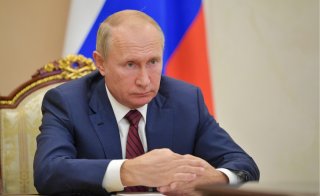After Putin, a Putina?
The rising profile of his cousin, Anna Putina, suggests Vladimir Putin may be set on dynastic succession.
Indeed, Anna Putina has been actively preparing for such a role. It has become common practice among Kremlin powerbrokers to publish vanity doctoral dissertations. Vladimir Putin published his in 1997 at the Mining Institute in St. Petersburg entitled “Strategic Planning in the Reproduction of the Natural Resource Sector in Market Economic Conditions in the St. Petersburg Region.” In 2022, Putina published her doctoral dissertation on “Management of the Development of the Production-Technological Potential of Coal Industry Enterprises” at the state-affiliated All-Russian Scientific Research Institute in Moscow. The similarity of research topics, natural resource management, is hard to miss.
Many analysts like to conceive of the Kremlin as a mafia organization. There is truth in this metaphor, but it is incomplete. We believe the best way to think about Russian governance is as one enormous intelligence special operation. All of the real insiders were recruited as Soviet intelligence officers in the 1970s and 1980s when then KGB Chairman and Putin’s idol Yuri Andropov was very consciously recruiting the “best and the brightest.” In December 2000, Putin’s then Director of the Federal Security Services (FSB) and current Chair of the National Security Council, Nikolai Patrushev, described Russia’s intelligence officers as Russia’s “new nobility.” The “Higher Police,” described by Clifford Gaddy and Laurence Muravschik in The National Interest in 2002, have viewed themselves for centuries with a special mission to save Russia from traitors within and outside the country. The war in Ukraine is not a war for the Kremlin but a “special military operation.” The plan for Putin’s succession in 2007–8 was called “Operation Successor.” There is no subtlety here. The plan to promote Anna Putina could be just another “special operation.” At this point, it appears that Deputy Chief of Staff to the President (with responsibility for domestic affairs, Sergei Kiriyenko, is the likely curator of the Anna Putina project, but aspects of this subtle stage management recall the work of former Kremlin spin doctor Vladislav Surkov who orchestrated “Operation Successor.”
If we are right about Anna Putina, then the Kremlin seeks to prolong the Putin dynasty for another generation. Putin, as an avid student of Russian history, may find the idea of a hereditary dynasty attractive. However, while it has become a cliche to read of Putin as the “new czar” of Russia, his idea of succession is less neo-Romanov than it may initially appear. The dynastic model has also been deployed in other post-Soviet states like Azerbaijan and Turkmenistan, and it appears that Emomali Rahmon, President of Tajikistan, is also looking to place his son as leader in 2024.
For all of these regimes, where electoral and legal norms for an orderly transition do not exist, succession is a continual dilemma. Many dictators aspire to the Deng Xiaoping or Lee Kuan Yew models of exercising power more informally after leaving their formal positions. Both the dynastic and “grey cardinal” models fail as often as they succeed. Just look at Russia’s neighbor Kazakhstan, whose founding President Nursultan Nazarbayev’s effort to remain the power behind the throne was stymied in January 2022. Only time will tell if Putin’s plan is for his cousin Anna to succeed him, and then, more importantly, whether “Operation Putina” will be successful and durable.
Chris Monday is an Associate Professor of Economics at Dongseo University in Busan, South Korea.
Andy Kuchins is a Senior Fellow at the Center for the National Interest and Adjunct Professor at the Johns Hopkins University School of Advanced International Studies in Washington, DC.
Image: Shutterstock.com.

